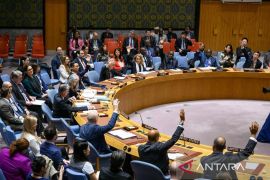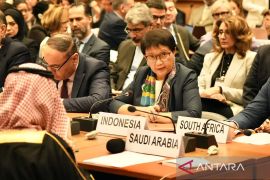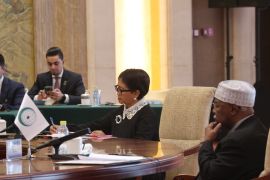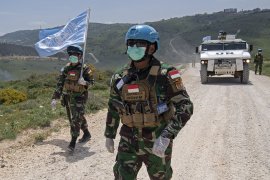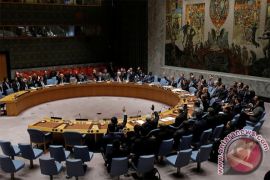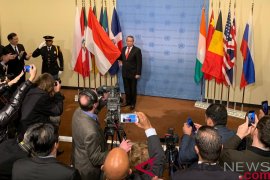It was the third time that Russia, a key ally of the Syrian government, and China have used their veto power to block resolutions designed to pressure Syrian President Bashar al-Assad and halt the 16-month conflict that has killed thousands.
Western states that pushed the resolution reacted angrily to the Russian and Chinese vetoes.
"The effect of their actions is to protect a brutal regime. They have chosen to put their national interests ahead of the lives of millions of Syrians," Britain`s U.N. ambassador, Mark Lyall Grant, told the 15-member Security Council after the vote.
The U.S. ambassador to the United Nations, Susan Rice, called the Russian and Chinese moves "dangerous and deplorable" and said the Security Council had "failed utterly." French Ambassador Gerard Araud called it a sad day for Syria.
U.N. Secretarty-General Ban Ki-moon said he was "deeply disappointed."
"I had expected that the Security Council and the international community should have been united to send out a strong and united voice to save human lives," he told reporters as he arrived for a visit to Slovenia.
International mediator Kofi Annan, who had sought a tough resolution to save his disintegrating peace plan, also voiced disappointment, saying the council had failed to take "the strong and concerted action" he had urged and hoped for.
As diplomatic efforts appeared to collapse, Syrian rebels clashed with forces loyal to Assad in Damascus a day after the killing of three allies of the president led to fresh warnings that the situation was spinning out of control.
The Western-backed resolution, which would have extended a U.N. observer mission in Syria for 45 days, received 11 votes in favor, while South Africa and Pakistan abstained.
"We simply cannot accept a document ... that would open the path for the pressure of sanctions and further to external military involvement in Syrian domestic affairs," Russia`s U.N. Ambassador Vitaly Churkin told the council.
Western council members have said they were talking about a threat of sanctions on Syria, not military intervention. Their resolution had contained a specific threat of sanctions if Syrian authorities did not stop using heavy weapons and withdraw troops from towns and cities within 10 days.
30 day mission extensions?
Russia had proposed its own alternative resolution to extend the U.N. mission for three months without the sanctions threat but did not bring that measure to a vote because Churkin said he wanted to avoid further confrontation. Western diplomats said the Russian resolution had little support in the council.
The Security Council still has time to negotiate another resolution on the fate of the unarmed U.N. observer mission before its initial 90-day mandate expires at midnight on Friday (0400 GMT Saturday).
After the vetoes by Russia and China, Britain proposed a new brief resolution to extend the monitoring mission for 30 days, which it hoped to put to a vote on Thursday.
But Churkin said he would need to report back to Moscow on Britain`s new proposal and this would delay any vote on extending the U.N. mission until Friday.
Lyall Grant said Britain`s new resolution would only allow for an extension of the mission beyond the additional 30 days if the Syrian authorities had stopped using heavy weapons and had withdrawn troops from towns and cities - and if the level of violence had decreased enough to allow the mission to work.
Rice said Washington might consider "a final brief extension." However, she added, "The United States has not, and will not, pin its policy on an unarmed observer mission that is deployed in the midst of
such widespread violence and that cannot even count on the most minimal support of this Security Council."
"Instead, we will intensify our work with a diverse range of partners outside the Security Council to bring pressure to bear on the Assad regime and to deliver assistance to those in need."
The United States has been instrumental in forming the "Friends of Syria" group, which includes a range of Western and Arab countries, that has sought to increase pressure on Damascus and encourage more unity among Syria`s fractured opposition.
Negotiations were due to take place on the new British draft resolution later on Thursday.
The Security Council initially approved the deployment of the observer mission, known as UNSMIS, to monitor a failed April 12 ceasefire. UNSMIS suspended most of its monitoring activity on June 16 due to increased risk from rising violence.
Chemical weapons
Rice noted that the escalating violence was sharpening concerns over Syria`s undeclared stockpile of chemical weapons, believed to be the largest of its kind in the Middle East.
"As the situation deteriorates, the potential that this regime could consider using chemical weapons against its own people should be a concern for us all," she said.
Syria`s Ambassador Bashar Ja`afari maintained Damascus` commitment to Annan`s peace plan and said authorities would not use chemical weapons against the Syrian people.
"What has been said of late, in the media, about chemical weapons, the intention of Syria to use chemical weapons, has no basis whatsoever," he told the council.
China`s U.N. Ambassador Li Baodong said he had pushed for consensus among the council on Syria, but that the Western-backed resolution had been "seriously problematic with uneven content that is intended to put pressure on only one party."
"It would not help resolve the Syrian issue," Li told the council. "It would not only further aggravate the turmoil but also result in spillover of the problem into other countries in the region." (C003)
Editor: Kunto Wibisono
Copyright © ANTARA 2012


